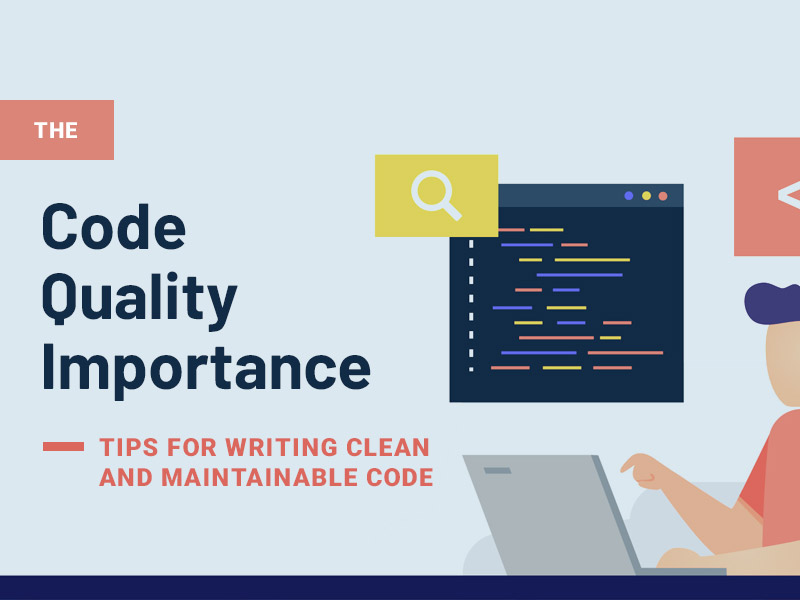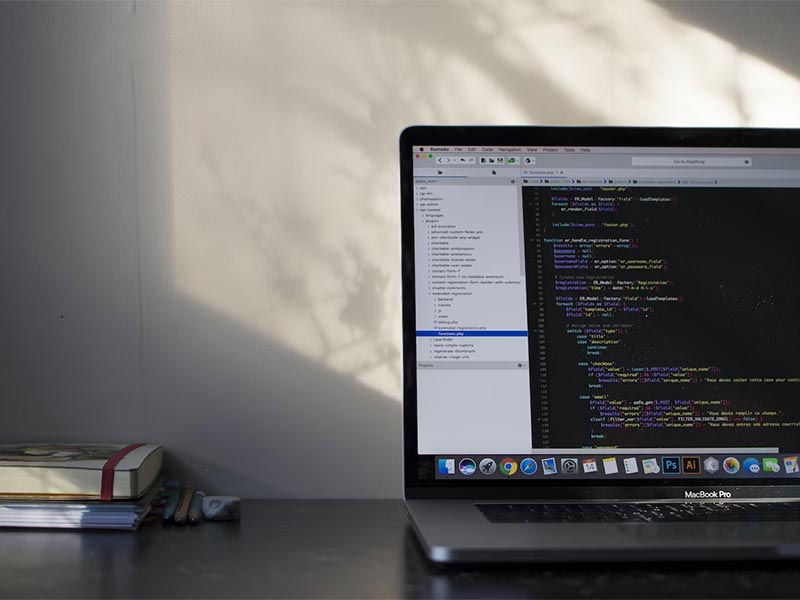As the progression of software development grows at an unparalleled speed, the gravity of premium quality code caliber has never been as paramount as before.
In the current cutthroat environment, software packages are required to exhibit high dependability, effectiveness and manageability.
Similarly, the source code is instrumental in accomplishing these objectives by exerting a significant impact on them. This has increased the rate at which organizations hire mobile app developers who are well-versed with the dynamics of complex codings.
In this blog we will briefly walk through the fundamental reasons why code quality is important and delve into the tips through which a clean and maintained code is executed.
Let us get right into it!
Why is Code Quality Important?
The nature of code quality pertains to the attributes intrinsic to software programming that enable it to be effortlessly comprehended, adapted and upheld. The triumph of a software application is prominently influenced by the excellence of its codebase.
The following are some reasons why code quality is crucial in software development:
1. Maintainability
High-quality code is easy to maintain and update. As the magnitude and evolution of software applications increase, it is paramount to possess code that can be effortlessly modified and expanded.
2. Reliability
Clean and well-written code is less likely to contain errors and bugs. Consequently, software that has been endowed with codes of superior standard exhibits increased stability and reduced likelihood of malfunction or crash.
3. Efficiency
Well-designed code is typically more efficient than poorly written code. It follows that software with superior coding can effectively manage increasingly large amounts of data and expedite operations more expeditiously.
4. Scalability
Code that is easy to modify and extend is also more scalable. It is thereby indicated that in proportion to the growth and alteration of an application, its codebase can be further developed without attaining excessive intricacy or posing any maintenance-related challenges.
Tips for Writing Clean and Maintainable Code
Having discussed the reasons why code quality holds significant value, let us now venture into certain pointers that help to craft immaculate and sustainable codes.
1. Keep It Simple
Among the fundamental tenets of producing superior code is to ensure that it remains uncomplicated. To attain this objective, it becomes imperative to steer clear of an overabundance of complexity and instead place emphasis on simplifying the architecture in a fashion that fosters lucidity without relinquishing efficacy. Avoid using overly complex solutions when a simple one will suffice. The comprehension of the code can be simplified, while simultaneously facilitating its future maintenance and update.
2. Use Consistent Formatting
Crafting a uniform style for your codebase is an advantageous method of rendering it more comprehensible and legible. Choose a formatting style and stick to it. This includes indentation, spacing, and naming conventions. The adherence to an unwavering format becomes the facilitator for several developers’ collaboration on a singular codebase, thereby streamlining progress.
3. Write Self-Documenting Code
Crafting code that documents itself is one of the prime ways to amplify its readability. This means using meaningful variable names, comments, and function names to make the code easier to understand. Avoid using abbreviations or overly complex naming conventions that can confuse other developers.
4. Avoid Hardcoding Values
Avoid hardcoding values into your code whenever possible. Instead, use constants or configuration files to store these values. It becomes simpler to make alterations to these metrics in the coming days without necessitating any changes made on the codebase. In future instances, modifications of said values would be expedient and free from constraints that demand adjustments at a code level.
5. Don’t Repeat Yourself (DRY)
The precept of software engineering known as DRY, or Don’t Repeat Yourself, is a linchpin principle. It states that any piece of code should be written only once. It is important to steer clear of redundancy in coding endeavors. As such, strive towards the minimization of duplicate code occurrences wherever feasible. In the event that you discover yourself replicating and pasting code, it may be worthwhile to revamp said code into a function capable of being employed multiple times.
6. Write Unit Tests
The production of superior code requires the crucial aspect of creating unit tests. Unit tests aid in verifying that your codes are functioning appropriately and can detect issues before they reach their release environment. Besides, crafting these evaluations may enhance the durable nature of a program’s underlying source code as well.
7. Use Version Control
The utilization of version control is critically paramount for any software development project. It essentially enables numerous developers to collaboratively contribute and monitor modifications made to the codebase over time with ease. With its implementation, the reversal course in case of misstep or inadvertent error becomes conspicuously streamlined.
8. Follow Coding Standards
Following coding standards is another crucial aspect of writing high-quality code. Many programming languages have established coding standards that provide guidelines on how to structure code and name variables. As you hire Laravel developers or any team of programmers working closely with PHP framework, they will follow the guidelines such as using an indent of 4 spaces, keeping lines at approximately 75-85 characters long, and much more. Incorporating these guidelines renders the code more comprehensible and readable for other programmers.
9. Refactor Regularly
Refactoring pertains to the enhancement of code without inducing any modifications in its operation. The act involves improving and optimizing pre-existing source codes through a gamut of software engineering techniques, such as debugging or testing methods, while ensuring that no alterations occur within the overall functionality exhibited by said framework. Engaging in periodic codebase refactoring has the potential to heighten its manageability and comprehensibility. The practice of refactoring can further expeditiously unearth and rectify possible predicaments that could otherwise burgeon into substantial impediments.
10. Use Descriptive Comments
Providing supplementary information regarding the code is an exceptional approach through which we can impart comments. Yet, it’s imperative to avoid generic or overly specific comments as they may not be useful in determining the purpose of our codes. Instead, let us employ descriptive commentary that succinctly provides valuable insights about the intricacies within lines without indulging too much into scrupulous details.
11. Keep Functions Small
Large functions can be challenging to understand and maintain. By restraining the size of functions and confining their operations to a solitary task, it results in more effortless comprehension and readability of code. Small functions are also easier to test and reuse.
12. Be Consistent with Code Organization
The systematic modification of code is necessary to achieve organizational harmony. Grouping functions and variables that are interrelated, alongside employing names for directories and files with substantial meaning aids in constructing an orderly codebase. A meticulously arranged system simplifies the task of locating what developers need expeditiously.
13. Use Error Handling
Error handling is another critical aspect of writing high-quality code. Effective management of errors is crucial in safeguarding the operational stability and overall reliability of an application, mitigating risks associated with software malfunctions or system crashes. Be sure to use appropriate error messages that provide valuable information to the end-user or other developers.
14. Avoid Global Variables
The utilization of variables which are set globally may pose a challenge in ascertaining modifications made and provoke unanticipated responses. Avoid using global variables whenever possible and instead use local variables or pass variables between functions.
15. Use Performance Optimization Techniques
One must prioritize performance optimization when developing superior-quality code. Enhance your application’s speed by utilizing strategies like caching, lazy loading, and decreasing database queries. Nonetheless, avoid compromising the readability or maintainability of your program in exchange for a faster runtime.
Wrapping Up
The contemporary rapid software development sector demands code quality to an unprecedented degree.
Constructing high quality coding is significant for the creation of trustworthy, productive and extensible applications.
Adhering to precise code guidelines can enhance your coding’s superiority as well as increase its accessibility and ease of upkeep; benefits that extend not only unto yourself but also other programmers involved in the project at hand!







